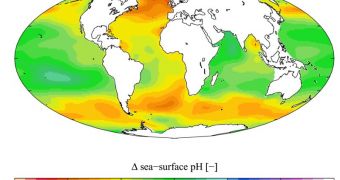According to the conclusions of a new study, it would appear that ocean acidification will most likely increase by as much as 170 percent by 2100. The international research report says that such a change will have devastating economic and social implications for our world.
In addition to significant economic losses, increased ocean acidification will also contribute to a decline in global food safety, since a very large percentage of the world's population takes its sustenance from the waters.
Changes in marine ecosystems and biodiversity are very likely to hit developing countries hardest, since this is where people rely on the ocean most. Massive declines in shellfish aquaculture and tropical coral reefs are very likely to be recorded around the world.
This document was developed by acidification experts who gathered in Monterey, California, in September 2012. Around 540 scientists from 37 countries met at the Third Symposium on the Ocean in a High CO2 World, marking the largest such gathering ever to take place.
The results will be forwarded to policymakers meeting in Warsaw, Poland, starting November 18, at the new round of UN climate negotiations. The most important message for states attending the meetings is that atmospheric carbon dioxide levels need to be reduced as soon as possible, e! Science News reports.
“What we can now say with high levels of confidence about ocean acidification sends a clear message. Globally we have to be prepared for significant economic and ecosystem service losses,” says scientist Ulf Riebesell, from the GEOMAR Helmholtz Center for Ocean Research, in Kiel.
“But we also know that reducing the rate of carbon dioxide emissions will slow acidification. That has to be the major message for the COP19 meeting,” adds the expert, who was one of the lead authors on the new summary, and a chair of the 2012 symposium.
The document argues that states need to take the necessary actions to prevent global temperatures from climbing above the 2 degree Celsius threshold established in 2010. If this is achieved by 2100, then roughly half of all surface waters will remain favorable for coral growth.
“Emissions reductions may protect some reefs and marine organisms but we know that the ocean is subject to many other stresses such as warming, deoxygenation, pollution and overfishing,” says Wendy Broadgate, who is the deputy director of the International Geosphere-Biosphere Program.
“Warming and deoxygenation are also caused by rising carbon dioxide emissions, underlining the importance of reducing fossil fuel emissions. Reducing other stressors such as pollution and overfishing, and the introduction of large scale marine protected areas, may help build some resilience to ocean acidification,” concludes the expert, who was also an author of the new study.

 14 DAY TRIAL //
14 DAY TRIAL //